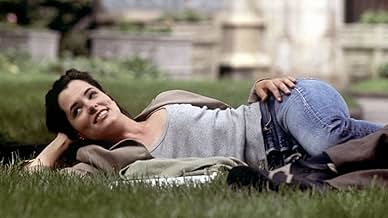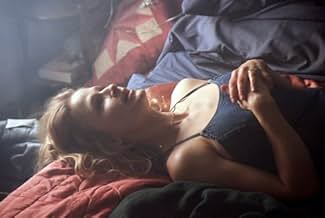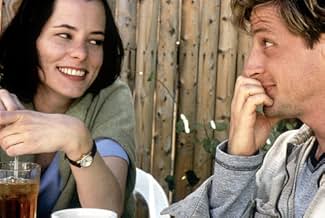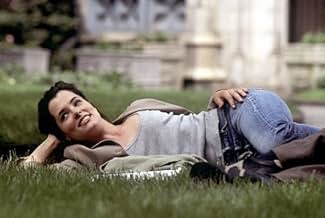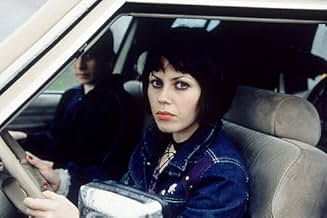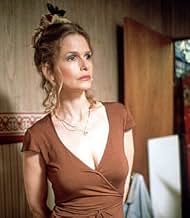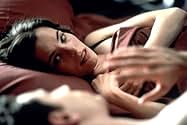IMDb रेटिंग
6.4/10
4 हज़ार
आपकी रेटिंग
अपनी भाषा में प्लॉट जोड़ेंThree women's escapes from their afflicted lives. Each struggles to flee from the men who confine their personal freedom.Three women's escapes from their afflicted lives. Each struggles to flee from the men who confine their personal freedom.Three women's escapes from their afflicted lives. Each struggles to flee from the men who confine their personal freedom.
- पुरस्कार
- 6 जीत और कुल 5 नामांकन
John Ventimiglia
- Narrator
- (वॉइस)
Joel de la Fuente
- Thavi Matola
- (as Joel De La Fuente)
फ़ीचर्ड समीक्षाएं
A critic I read before seeing this movie (Lynden Barber of the Sydney Morning Herald) opined that it was a book illustrated with film rather than a proper movie. He's right, but that does not make it a complete write-off. There is as much voice-over as in a football match (why use a male?) but the visuals still convey some of the stories, which are not all without interest.
There are three separate stories of women having trouble with men; two from the working class and one an upwardly mobile book editor. They are tenuously connected by a street incident. One has a bashing husband, another, a husband she has outgrown, and the third has problems with her boyfriend, her stepfather and her maternal instinct. All seem to favour running away as the solution; stand and fight is not the female way, at least not in New York State.
The author of the original short stories is Rebecca Miller, who also directed from her own screenplay. This certainly accounts for the literary quality. Rebecca has a famous literary father, the great Arthur Miller, and I suspect he is in the film somewhere as a character or at least a presence. The working class girl stories are too trite to be involving (though very well played by Kyra Sedgwick and Fairuza Balk) but the middle story of the book editor (played coolly by Parker Posey) rings true. The use of digital video suits the subject-matter (Dogma 95 on the Hudson) and the whole thing is competently realised. It is the weakness in the first and third stories that disappoints.
There are three separate stories of women having trouble with men; two from the working class and one an upwardly mobile book editor. They are tenuously connected by a street incident. One has a bashing husband, another, a husband she has outgrown, and the third has problems with her boyfriend, her stepfather and her maternal instinct. All seem to favour running away as the solution; stand and fight is not the female way, at least not in New York State.
The author of the original short stories is Rebecca Miller, who also directed from her own screenplay. This certainly accounts for the literary quality. Rebecca has a famous literary father, the great Arthur Miller, and I suspect he is in the film somewhere as a character or at least a presence. The working class girl stories are too trite to be involving (though very well played by Kyra Sedgwick and Fairuza Balk) but the middle story of the book editor (played coolly by Parker Posey) rings true. The use of digital video suits the subject-matter (Dogma 95 on the Hudson) and the whole thing is competently realised. It is the weakness in the first and third stories that disappoints.
as you probably have heard, this is a movie that consists of three portraits. three very contrived, hard-to-watch portraits.
this movie charges out of the gate with incredible potential, including a great cast, an effective score, and nearly disorienting (yet, rather successful) camera work. additionally, at the start of the first portrait, the narrative freezes, and the narrator urges the viewer to, "wait!" so he can explain something about what's going on. this device is wonderful, and immediately gives the viewer a healthy shot of intrigue. additionally, at this point, you'll probably be really excited at the unorthodox pacing that the film seems to be setting up.
that's all in the first few minutes. and this movie literally screamed in a nosedive downward from there.
while "personal velocity" bucks conventions in many ways, it bucks the concept of storytelling so much that it is simply contrived. want to see development, plot, resolution? not here. this movie tries HARD to dodge all these things, and relentlessly starves the viewer of any of these elements with its spare dialogue.
but in the absence of these elements, what's left is - quite frankly - repetition. the characters simply keep doing what they did in the first moments of their portrait (or at least what the filmmakers set them up to do). and while they rather gratingly repeat their actions, there is no true character development.
to combat this (and surely the problem of converting short stories to film), the movie employs a narrator. this (and the repetition) is the downfall. first of all, who is the narrator? well, it's a male, which is strange since this is mainly a story about three women. ok, but why is he male? and why is he speaking so conversationally at some points? and why does he know of all these women? none of these questions are answered, and the viewer is forced to contend with this narrator who speaks incessantly throughout the entire film.
now this narrator suffers from an additional problem, which plagues the film: heavy-handedness. the narrator says things like, "she could feel the emotion like a vortex pulling her soul inward." that's actually not a direct quote, but it's very close. i am not exaggerating. at one point a character says, "you look you're waiting for something." and the narrator breaks in, "she was, she always has been." this movie can't afford such lead-weighted narration. and it certainly does not fall in line with the narrator's other parts where he's talking about how great kyra sedgewick's ass looks in jeans.
in the end, you've got however many minutes (i don't know 90ish?) of superb acting and inventive cinematography. but anchoring it down without an inch of slack to go anywhere is an overbearing narrator, and three equally overbearing and repetitious movements of what could have probably been a compelling film.
this movie charges out of the gate with incredible potential, including a great cast, an effective score, and nearly disorienting (yet, rather successful) camera work. additionally, at the start of the first portrait, the narrative freezes, and the narrator urges the viewer to, "wait!" so he can explain something about what's going on. this device is wonderful, and immediately gives the viewer a healthy shot of intrigue. additionally, at this point, you'll probably be really excited at the unorthodox pacing that the film seems to be setting up.
that's all in the first few minutes. and this movie literally screamed in a nosedive downward from there.
while "personal velocity" bucks conventions in many ways, it bucks the concept of storytelling so much that it is simply contrived. want to see development, plot, resolution? not here. this movie tries HARD to dodge all these things, and relentlessly starves the viewer of any of these elements with its spare dialogue.
but in the absence of these elements, what's left is - quite frankly - repetition. the characters simply keep doing what they did in the first moments of their portrait (or at least what the filmmakers set them up to do). and while they rather gratingly repeat their actions, there is no true character development.
to combat this (and surely the problem of converting short stories to film), the movie employs a narrator. this (and the repetition) is the downfall. first of all, who is the narrator? well, it's a male, which is strange since this is mainly a story about three women. ok, but why is he male? and why is he speaking so conversationally at some points? and why does he know of all these women? none of these questions are answered, and the viewer is forced to contend with this narrator who speaks incessantly throughout the entire film.
now this narrator suffers from an additional problem, which plagues the film: heavy-handedness. the narrator says things like, "she could feel the emotion like a vortex pulling her soul inward." that's actually not a direct quote, but it's very close. i am not exaggerating. at one point a character says, "you look you're waiting for something." and the narrator breaks in, "she was, she always has been." this movie can't afford such lead-weighted narration. and it certainly does not fall in line with the narrator's other parts where he's talking about how great kyra sedgewick's ass looks in jeans.
in the end, you've got however many minutes (i don't know 90ish?) of superb acting and inventive cinematography. but anchoring it down without an inch of slack to go anywhere is an overbearing narrator, and three equally overbearing and repetitious movements of what could have probably been a compelling film.
Closeup- Beth in Car Door Window-Door handle opening as someone gets in-Closeup of his handsome face--Beth: Can you excuse me, I have to stop for donuts. Closeup of Shop Door, Beth walking in then ignition key turning as hitch hiker moves her car. Beth looks away. Beth: Hurry with that couple of dozen, I'm pregnant. She carries the donut box out, gets into the car. The Hitch Hiker's hand grabs a donut from the box, Closeup of a donut hole. His mouth munches one down. Cut to Rain falling on car back window, steam rising and groans from within while he makes out with her. Later, interior, apartment, Beth's hand is seen picking up a script. The cover page reads, "Never use close camera angles or other devices so often it makes the viewer lose interest in the characters and story. Try to film a movie the way you'd like a live audience to watch it. Grade F, see me. Professor Hollywood Hack."
Writer and director Rebecca Miller(daughter of legendary playwright Arthur) patches together three stories of three different women for this film and the movie itself is quite an intriguing curiosity for it.
Delia(Kyra Sedgwick,familiar yet still distinctive here)is an abused housewife and mother who's only known really one thing about herself-her sexuality-and has to find a way out of her sad,low-esteemed predicament,while wondering if she should use her sexuality or not; Greta(Parker Posey,for whom the type of roles she could inhabit are practically limitless) is a career-driven woman whose marriage is peaceful but uninspiring; and Paula(Fairuza Balk,whose angry eyes and wild visage is an ironic contrast to the scared character she's playing),has escaped a horrifying accident and now aids a runaway teen,all the while mindful of the fact that she's just learned she's pregnant.
I must say I was quite pleased with elements of the movie:the narration,the anthology of it and,of course,the actors,who all are very fine here. But I suppose what left me dry here was the way these stories played out. I will not go into any detail so as to inadvertently throw out spoilers,but it to me felt like these stories were resolved in ways that seemed only evident to the writer herself. I read one reviewer describe these tales as sorts of "Women's lib" stories,and that may be true,and not being a woman myself and certainly not a feminist,I suppose if these endings seemed lost on me,well,that's my problem I suppose.
Not a movie for those who absolutely NEED their films to have a sort of set,rising-plot/climax/denouement model in order to digest their usage of 90 min to 2 hours of time,but I suspect that the film's creator doesn't really care about that. She set out to portray three ordinary yet intriguing characters and,for the most part,I feel like she succeeded.
Delia(Kyra Sedgwick,familiar yet still distinctive here)is an abused housewife and mother who's only known really one thing about herself-her sexuality-and has to find a way out of her sad,low-esteemed predicament,while wondering if she should use her sexuality or not; Greta(Parker Posey,for whom the type of roles she could inhabit are practically limitless) is a career-driven woman whose marriage is peaceful but uninspiring; and Paula(Fairuza Balk,whose angry eyes and wild visage is an ironic contrast to the scared character she's playing),has escaped a horrifying accident and now aids a runaway teen,all the while mindful of the fact that she's just learned she's pregnant.
I must say I was quite pleased with elements of the movie:the narration,the anthology of it and,of course,the actors,who all are very fine here. But I suppose what left me dry here was the way these stories played out. I will not go into any detail so as to inadvertently throw out spoilers,but it to me felt like these stories were resolved in ways that seemed only evident to the writer herself. I read one reviewer describe these tales as sorts of "Women's lib" stories,and that may be true,and not being a woman myself and certainly not a feminist,I suppose if these endings seemed lost on me,well,that's my problem I suppose.
Not a movie for those who absolutely NEED their films to have a sort of set,rising-plot/climax/denouement model in order to digest their usage of 90 min to 2 hours of time,but I suspect that the film's creator doesn't really care about that. She set out to portray three ordinary yet intriguing characters and,for the most part,I feel like she succeeded.
I am hard-pressed to explain the praise heaped on this movie, and must sadly choose the obvious. This film would never have been touted as it has if it were made by someone other than Arthur Miller's daughter/Daniel Day Lewis's wife.
Of the film's three vignettes--domestic violence survivor, conflicted editor, and confused runaway--the second is most telling. Greta, the failure to her family, craves success and power in the literary world and only needs to have her innate talents recognized to do so. Her skill is "trimming the fat" from others' writing. However, Ms. Miller seems to have had no such attention paid to her own work. The incessant and intrusive voiceover dialogue, I assume taken directly from her collection of short stories, features pseudo-deep lines that made me literally laugh out loud.
In addition, I found many of the camera tricks and plot devices amateurish and the characters shallow and essentialized. I cannot recommend this film, which basks in its own specialness and its claims to gritty reality. Ms. Miller is a tourist in the lives of the struggling women she attempts to portray.
Of the film's three vignettes--domestic violence survivor, conflicted editor, and confused runaway--the second is most telling. Greta, the failure to her family, craves success and power in the literary world and only needs to have her innate talents recognized to do so. Her skill is "trimming the fat" from others' writing. However, Ms. Miller seems to have had no such attention paid to her own work. The incessant and intrusive voiceover dialogue, I assume taken directly from her collection of short stories, features pseudo-deep lines that made me literally laugh out loud.
In addition, I found many of the camera tricks and plot devices amateurish and the characters shallow and essentialized. I cannot recommend this film, which basks in its own specialness and its claims to gritty reality. Ms. Miller is a tourist in the lives of the struggling women she attempts to portray.
क्या आपको पता है
- ट्रिवियाMaria Elena Ramirez's debut.
- भाव
Greta Herskowitz: How could he still love me? If he does, it's because he doesn't know me. I'm rotten with ambition, a lusty little troll, the kind of demon you'd find at the bottom floor of hell pulling fingernails off the loansharks.
- क्रेज़ी क्रेडिटTo my mother
- कनेक्शनFeatured in Personal Velocity: Creating 'Personal Velocity' (2003)
टॉप पसंद
रेटिंग देने के लिए साइन-इन करें और वैयक्तिकृत सुझावों के लिए वॉचलिस्ट करें
- How long is Personal Velocity?Alexa द्वारा संचालित
विवरण
बॉक्स ऑफ़िस
- बजट
- $1,25,000(अनुमानित)
- US और कनाडा में सकल
- $8,11,299
- US और कनाडा में पहले सप्ताह में कुल कमाई
- $29,943
- 24 नव॰ 2002
- दुनिया भर में सकल
- $8,90,502
- चलने की अवधि1 घंटा 26 मिनट
- रंग
- ध्वनि मिश्रण
- पक्ष अनुपात
- 1.85 : 1
इस पेज में योगदान दें
किसी बदलाव का सुझाव दें या अनुपलब्ध कॉन्टेंट जोड़ें

टॉप गैप
By what name was Personal Velocity: Three Portraits (2002) officially released in India in English?
जवाब

